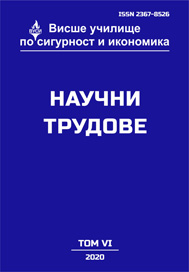Азербайджан и Туркменистан на газовата шахматна дъска
Azerbaijan and Turkmenistan on the gas chessboard
Author(s): Teodor Danailov DechevSubject(s): Politics / Political Sciences, Politics, Economy, National Economy, International relations/trade, Geopolitics
Published by: Висше училище по сигурност и икономика (ВУСИ)
Keywords: Azerbaijan; Turkmenistan; Armenia; Russia; TANAP; TAP; Southern Gas Corridor; TAPI; Trans Caspian pipeline; Transcaucasia; Central Asia; SOCAR; Rosneft
Summary/Abstract: In this monograph, the process of dynamic geopolitical and geoeconomic changes in Transcaucasia and Central Asia is analysed in the context of the diversification of the energy export markets of Azerbaijan and Turkmenistan. The role of the completion of the TANAP and TAP gas pipelines, with which the Southern Gas Corridor reaches from the Shah Deniz II gas field to the Italian port of Brindisi, is considered. The financing of the construction of TANAP, as well as the political and economic assistance from the EU and the USA for it are considered. The interests of the players on the "gas chessboard" in the context of the construction of the Southern Gas Corridor and the prospect of building a Trans-Caspian gas pipeline to connect it with the fields of Turkmenistan, have been identified. The failure of the trade policy of the Russian Federation in the natural gas trade with Turkmenistan in the period 2009-2019 and the new role of China as a consumer of hydrocarbons from the fields in Central Asia are analyzed. The peacekeeping effect of the construction of the Tukmenistan-Uzbekistan-Kazakhstan-China gas pipeline and the construction of the TAPI gas pipeline (Turkmenistan-Afghanistan-Pakistan- India) is indicated. The issue of the existing risks and possible threats along the entire route of the Southern Gas Corridor (from Azerbaijan to Italy) is considered in details in the context of the possibility to be connected to the natural gas fields in Turkmenistan. This analysis is closely linked to the history of the „Turkmen Gambit“ – Russia's opposition to the direct supplies of Turkmen gas to Europe, as well as Russia's and Iran's struggle against the construction of the Trans-Caspian gas pipeline. The role of the EU in promoting the construction of the Trans-Caspian gas pipeline and its new policy in Central Asia is highlighted. The synergy between the EU's strategic interest in the construction of the Trans-Caspian gas pipeline and China's trade interest in participating in its construction has been analysed. A special place is given to the risks and threats arising from the unresolved conflict between Armenia and Azerbaijan. The preventive measures taken by the Azerbaijani government to mitigate the possible overreaction of Russia from the loss of the mo nopoly of gas supplies in Southeast Europe are also analysed. The diplomatic and economic maneuvers of Azerbaijan are outlined, with special attention paid to the cooperation between the Azerbaijani state oil company SOCAR and the state Russian company OAO „NK Rosneft“. The monograph contains 28759 words or 200777 symbols, which corresponds to 112 standard pages.
Journal: Научни трудове - Висше училище по сигурност и икономика
- Issue Year: VI/2020
- Issue No: 1
- Page Range: 171-259
- Page Count: 89
- Language: Bulgarian

